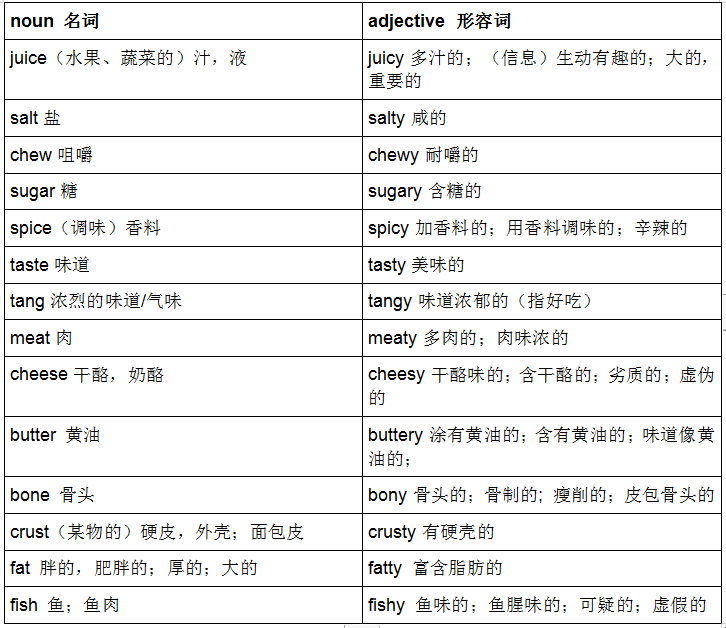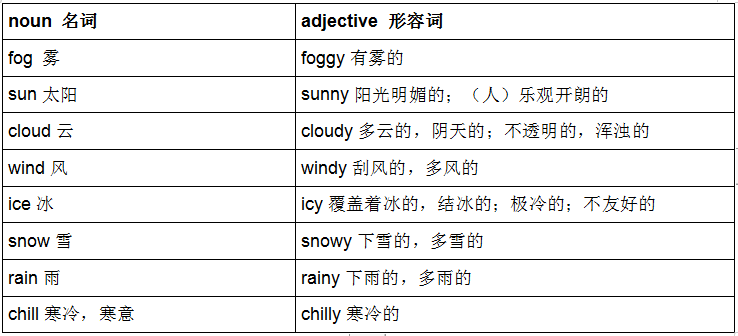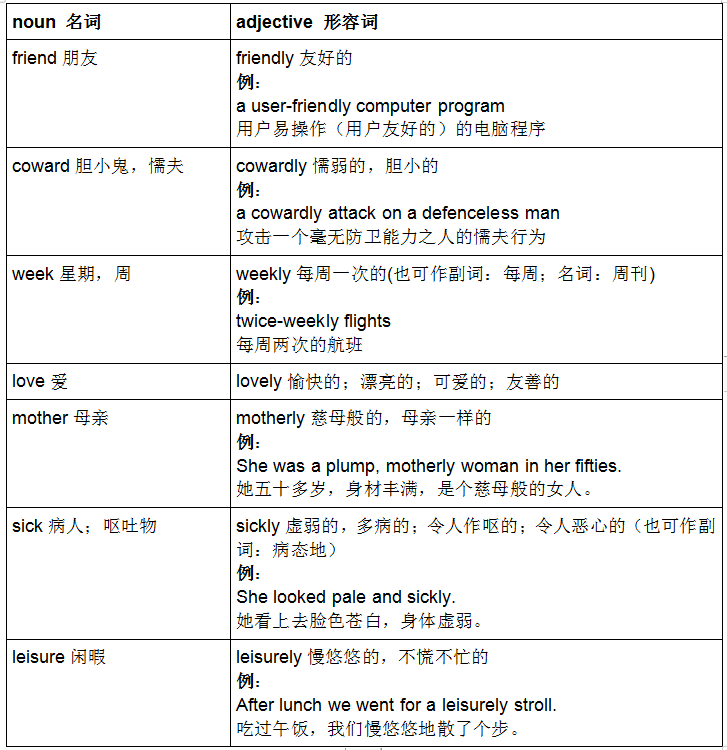
开篇笔者想请大家回答一个问题:在学英语的时候遇到的最困难的事情是什么呢?让我来猜一猜,是不是记单词?笔者在多年英语教学过程中观察发现,学生们最想要逃避的就是记单词。每次听写前都要临时抱佛脚,运用他们较好的短期记忆力快速记住单词的拼写,避免在听写的过程中“丢人”。但作为一名英语教学者,从不会觉得坐在面前写不出单词的学生不努力,而是会思考是否这个学生记单词的方法需要改进?又或者生词是不是太多了?因此笔者想从基础的点出发,详细讲解词汇的基本变化:名词是如何转变成形容词的,意在使学生掌握最基本的词汇变化规律,从而在积累词汇的时候更高效,更轻松。此外,请大家一定结合context(背景)加深自己对单词的理解,故笔者提供了大量例子供英语学习者理解。
1.名词+-y构成形容词
在名词后加y构成形容词的方式是非常普遍的。当它与名词相结合时,可表示full of… (多…的),having…(有…的),containing …(含…的),大多数加在单音节名词之后[1]。
Skillful Listening & Speaking Foundation留预一级课本中Unit 5中vocabulary skill(词汇技能)提到这一知识点,请大家注意观察变化的规律[2]:

以Textures and Flavors为例:

以下是截取自Skillful Listening & Speaking Foundation留预一级课本Unit 5中对最喜欢的食物的两段描述:
1:“My favorite street snack here in Brazil is cheese bread. They are little balls of bread, and we eat them as a snack, but also for breakfast. They’re very soft and chewy, and also a little bit sour. They taste like cheese, of course! We buy them on the street, but these days we also make them at home. They’re very easy to make.” [2]
2:“The Gatsby is a popular street sandwich here in South Africa. No two are the same, but it’s basically crispy French bread with meat or fish, plus cheese and salad. What makes a Gatsby different from other sandwiches are the French fries inside it. We put hot sauce on it to make it spicy. Without that it could be bland.” [2]
除了描述味道和口感的词汇符合这一构词规则,还有英国人每天都要讨论的天气,也是使用的这一变化规则:
Weather

让我们来看一段英国的天气预报(截取自Englishpod :Weather Forecast)
“A: What’s the weather looking like today, Kenny?
B: Well, it’s a bit of a mixed bag in Utah today; we’ve
got heavy cloud cover here in Northern Utah, and
we’re calling for scattered showers throughout the
day, with a day-time high of forty-five degrees. Now,
if we move down to the south of the state, we can
see that a cold front is moving in. We can expect
clear skies, but it will be quite cold, with
temperatures hovering around the thirty degree
mark.
A: It’s a chilly day folks, so don’t forget your coats!
What about tomorrow Kenny? Do you have good
news for us?
B: Well, it’ll be a rainy day for Northern Utah; we can
expect some isolated downpours in the morning.
Winds will be coming in from the North East, with
gusts reaching twenty-three miles per hour.” [3]
2.名词+-ly (having this quality) 构成形容词:
大家都知道-ly可以加在几乎一切形容词后面,使其变成副词。此外,它的第二个用途就是加在名词后面充当形容词后缀,其含义为“having qualities of”(具备…特性的)。加在时间名词之后,表示“每…地”、“每…时间一次的”;这类词有的可兼作名词,表示报刊[1],比如weekly,monthly,quarterly等。
具体词汇和例子如下:

使用这类词汇的时候,要注意不能被-ly后缀给糊弄了,把它当作副词来使用哦。
常见错误:He treated me very friendly.
正确表达:He treated me in a friendly way.或 He was very friendly to me.
此外,“lovely”也是一个频繁出现在英国人口语表达中的例子,它不仅有“可爱的”含义,也有“开心的”,“令人满意的”,“很不错”的意思,类似中文中的“好呀”,“不错”,“好极了”。
例子:
对话1(截取自Englishpod-Daily Life-I’m sorry, I love you- C0028):
“B: Thank you for such a lovely evening! The food was amazing, and I had a great time.
A: Me too. You look so beautiful tonight! I wish this night would never end. There’s something I have to tell you...” [3]
对话2(截取自Englishpod-Global View-All about wines- C0346):
“Customer: Let’s see. The label says it’s got” attractive citrus and grassy aromas that give way to crisp, mineral flavors and a bone-dry finish. Serve chilled.” Oh, no, how long will it take to chill the wine? I’m on my way to the dinner now.
Salesperson: It’s OK, don’t worry, we’ll just choose a wine from the cooler. We don’t have quite as extensive a selection over here, but...this Rhone Valley white would be lovely.”[3]
对话3(截取自Englishpod-Daily Life-New guy in town- C0050)
“A: Please make yourselves at home. Let me take your coats. Dinner is almost ready; I hope you brought your appetite
B: Your house is lovely, Armand! Very interesting decor...very...Gothic.”[3]
对话4:
A: See you tomorrow.
B: Lovely, see you then.
参考文献:
[1] 蒋争.英语词汇的奥秘-英语单词学习手册[M].北京:中国国际广播出版社,1986.
[2] David Bohlke,Dorothy E.Zemach.Skillful Listening & Speaking Foundation[M].London: Macmillan Education,2013.
[3] Englishpod[OL].Praxis Language